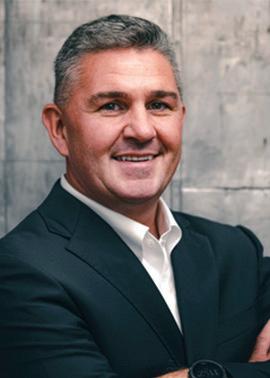
5 minute read
Building the Rev’s New State-of-the-Art Fields
By Patrick Maguire, RLA
Established as one of the original Major League Soccer franchises by Robert Kraft in 1994, the New England Revolution called the old Foxboro Stadium home until the completion of Gillette Stadium in 2001. The Revs’ original training ground was at the Foxborough State School. While it has “state” in the name, it certainly was not “state-ofthe-art.”
Advertisement
In 1999, two under-drained sand-based fields, shared with the New England Patriots, were constructed as part of the Gillette Stadium project which opened in 2001. A third sand-based field was constructed in 2002 as the principal training field for the Revolution, though it too was utilized by the Patriots when the Revs were not in season.
The ongoing success of the six-time World Champion Patriots, coupled with expansion of the Rev’s fanbase and the popularity of the Revolution’s Academy, made the need for a more specific “soccer only” training facility a top priority for the Kraft family and Revolution management.
The Kraft Group engaged Activitas, field consultants for the Patriots and Revolution for more than a decade, to study sites around Gillette Stadium and Patriot Place to locate a new stateof-the-art training facility for the Revs’ First Team and Revolution Academy. Multiple sites were considered, and a 68-acre parcel located behind Patriot Place and the Empower Field House was selected.
The site was not without significant challenges. Of the 68- acres, only 24 could feasibly be utilized for development of the facility. The site was quarried throughout the 1960s, leaving it devoid of topsoil. Significant grade changes and streams rerouted as part of the quarry operations divided the site. Over time the site became dappled with depressions that created new wetland areas which are now under state, local and federal jurisdiction.
Club ownership and the design team viewed the traditional development shortcomings of the parcel as an opportunity to transform the derelict site into a one-of-kind training facility. Instead of conventional cookie cutter fields clustered side by side and end to end, the design dispersed the fields throughout the site, linking them with natural woodland pathways, boardwalks and pedestrian bridges. Degraded wetlands and riverfront were restored with imported engineered soils, native wetland and upland seed mixes. More than 350 native trees, 550 shrubs and 1000 grasses and herbaceous ground cover plants were planted to create habitat value and a native New England forest aesthetic.
The first phase of the project, a 111,000 sq. ft. training field, was completed in the Fall of 2017. Initially utilized by the First Team, it consisted of a 10" sand based rootzone over a 4" pea stone drainage blanket and underdrain system.
The second phase of the project, just completed in October 2019, consists of a new 19,000 sq. ft. state-of-the-art training building. Designed by Populous, the building includes lockers for the First Team and Academy programs; a full-service kitchen and dining area; strength, conditioning and training rooms; media support; and offices for Revolution management, operations and sales staff.
Adjoining the new building are two First Team fields surrounded by large earth berms landscaped with native vegetation. Totaling approximately 226,500 sq. ft., the fields have a 10" sand-based profile over a 4" pea stone drainage blanket to match the field built in the initial phase. The 85/15 sand soil mix drains between 13 – 15 i.p.h. The sod is a blend of durable Kentucky bluegrass varieties (30% Midnight Star, 30% Brilliant and 40% P105) grown by Tuckahoe Turf Farms in New Jersey. The big-roll sod was cut and delivered at 1.25" to enable play immediately following installation.
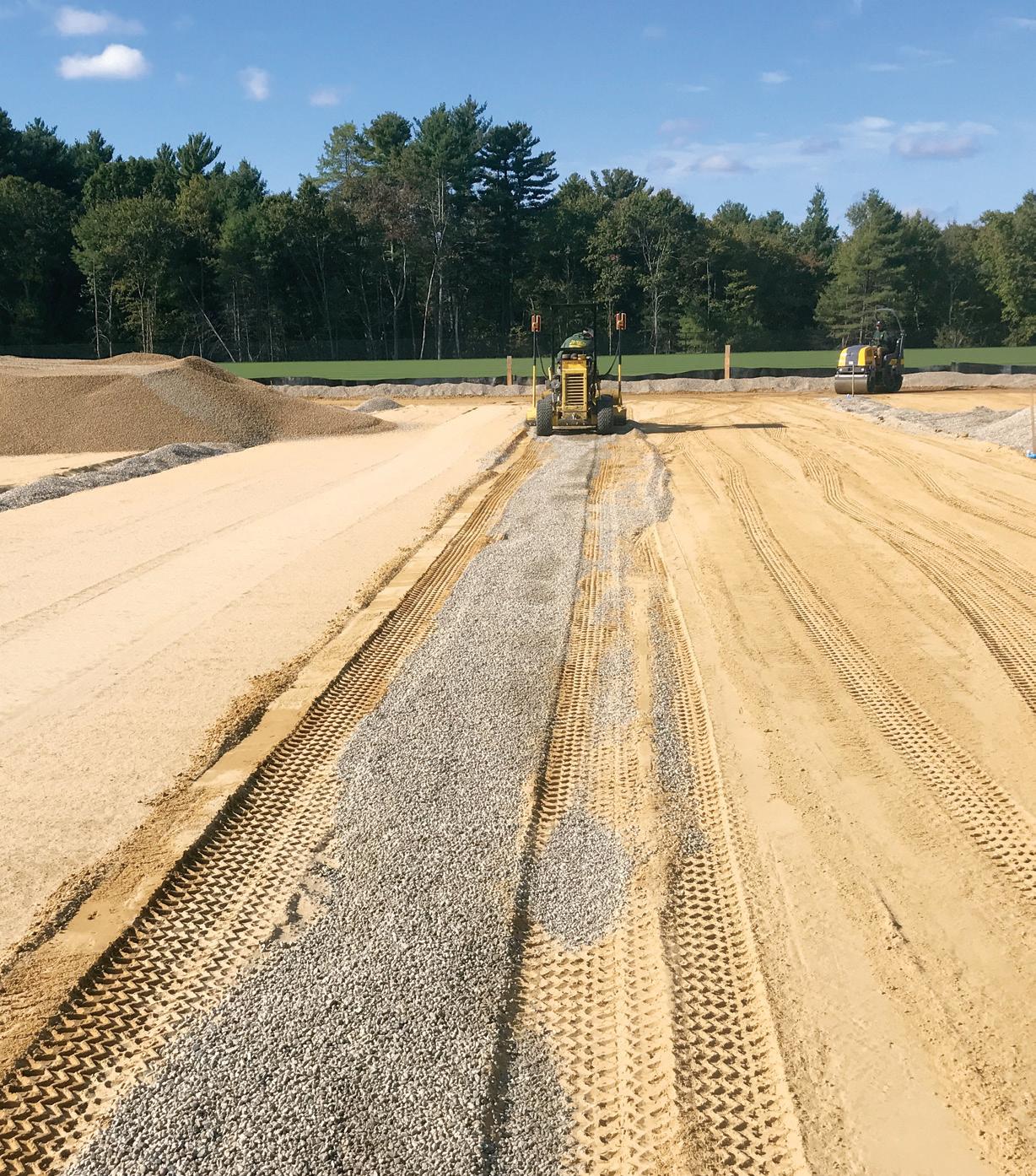
Subgrade preparation is critical for performance. STS crews laser grade subgrade and pea-stone drainage trenches prior to spreading drainageblanket materials.”
As “high performance” as the first field was conceived, constructed and maintained, this is where the similarities end. The First Team fields are next-level in concept and execution. Both are designed to share a three million BTU SubAir System to enable better air exchange and control of rootzone temperatures during the shoulder seasons. The fields are separated with a liner that will enable independent operation of the system depending on which field will be isolated for use.
The Northernmost field is the workhorse, augmented with a custom designed 15 million BTU glycol-based heating system. Located within the drainage blanket to provide better and more uniform heat distribution, it consists of more than 31 miles of ¾" PEX tubing placed at 8" o.c. To provide further temperature management, this field has infrastructure provisions for the future inclusion of a 3 million BTU McCloud Cover System by Covermaster. The system includes a translucent inflatable 2 mm tarp anchored every 10' o.c. to trap heated air while still providing the passage of almost 60% of available UV light.
This multi-faceted temperature management system will enable the Revolution to practice on grass during their February training camp, well before most grass fields in the Northeast have broken dormancy. It will also keep the field actively growing well into November to coincide with the MLS Cup Playoffs.
Other facility elements include a sod nursery for in season repairs, areas for off field storage of goals and equipment, and “Revolution Hill”, a 25' wide section of maintained grass. The hill climbs some 140' at 16% and is used for cardio training.
The fields were constructed by Sports Turf Specialties (STS) from Wrentham, Massachusetts led by NESTMA member Dennis Brolin who served as the Field Superintendent for the Patriots and Revolution from 1991 – 2003. Dennis guided construction of the original stadium field and the three existing practice fields. NESTMA member and former Patriots and Revolution Field Manager Jon Bengston helped conceive the new field profiles which are now managed by new Field Superintendent Ryan Bjorn and Assistant Superintendent Elliot Linstrum.
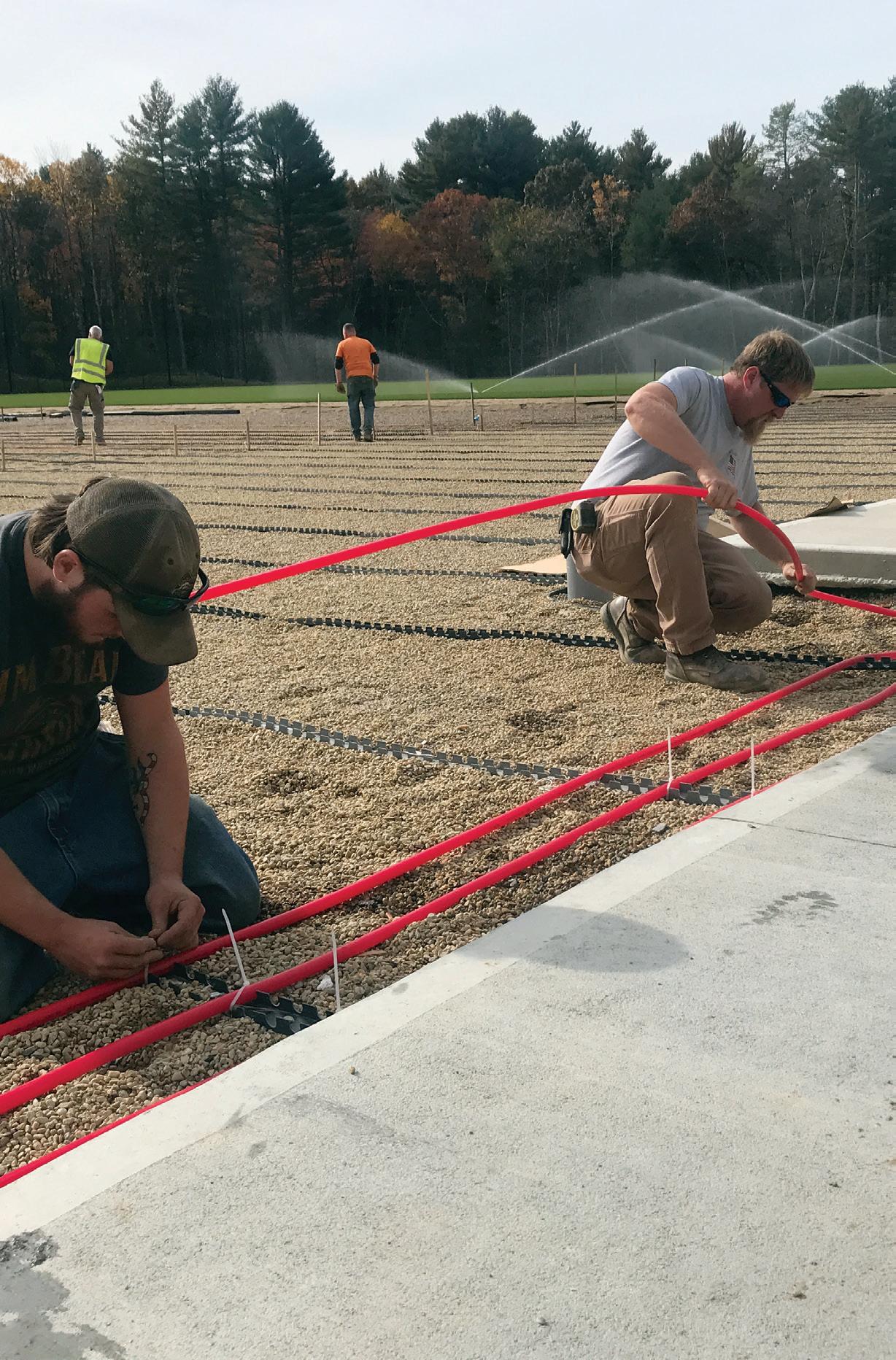
Installation of PEX tubing as part of glycol heating system at primary training pitch.
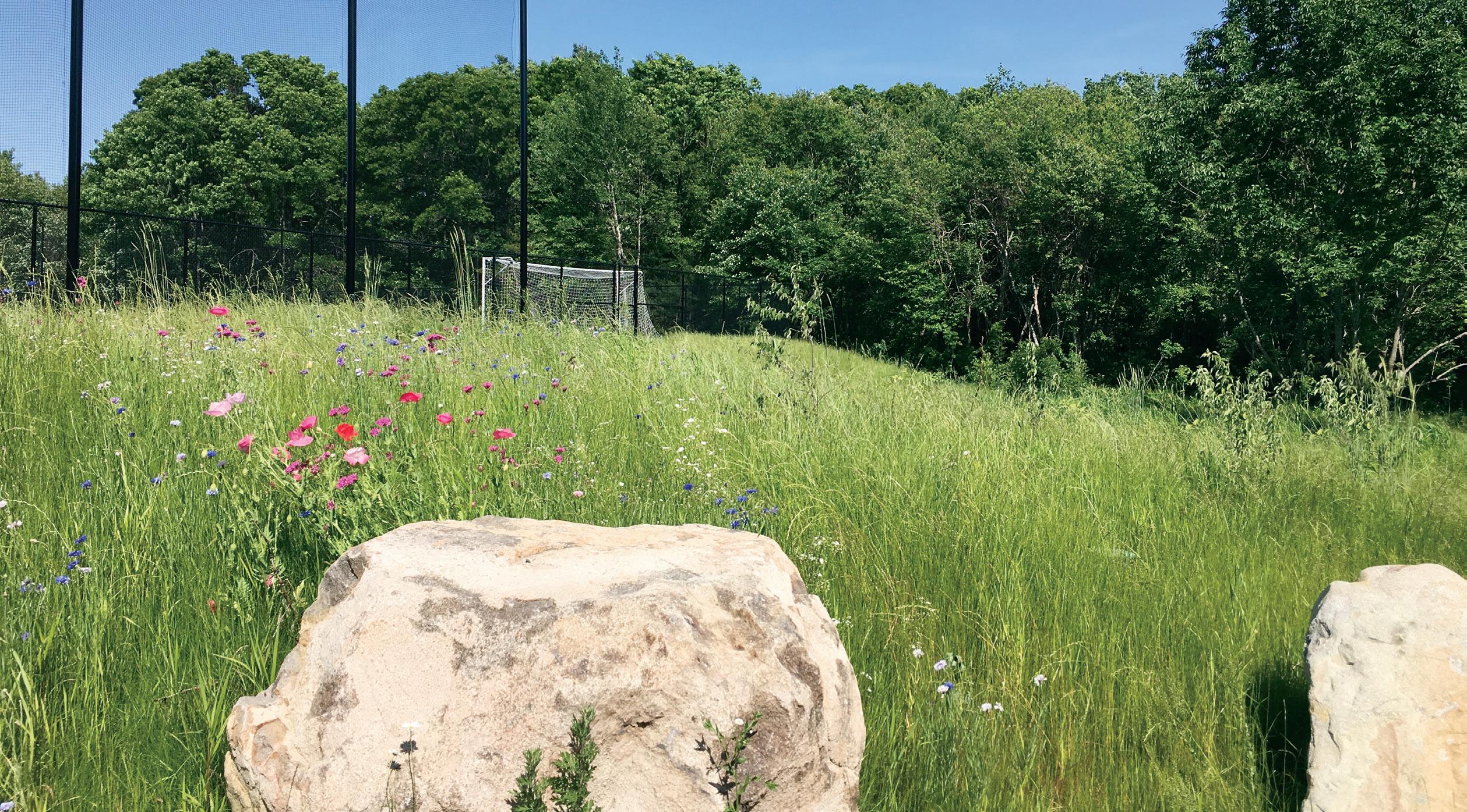
Wetland and upland restoration seed mix and native shrubs were planted to heal the degraded site, provide habitat value and erosion control.
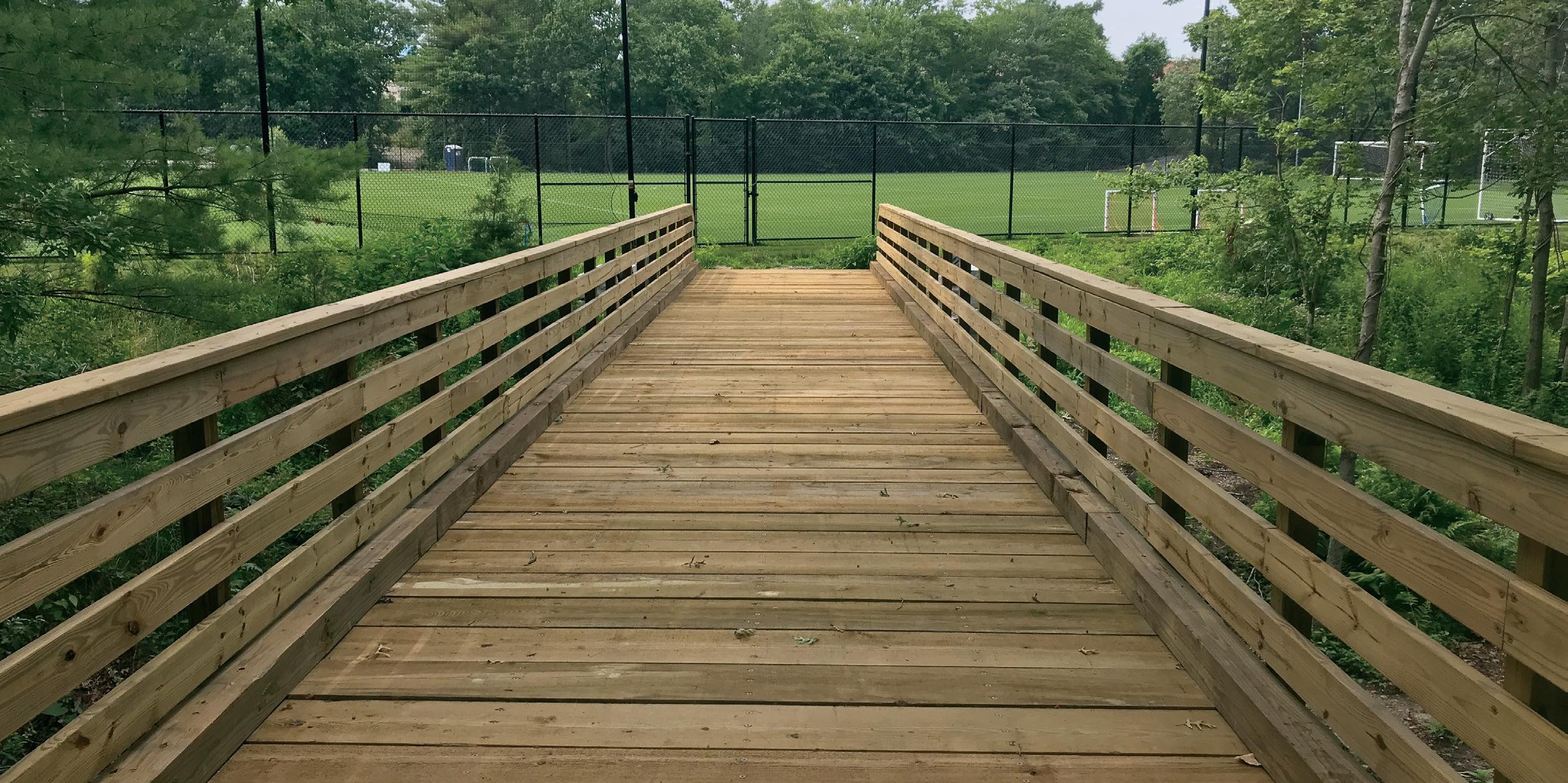
Boardwalks and pedestrian bridges were built to span wetlands and provide rustic connections between the new building and the individualtraining fields.
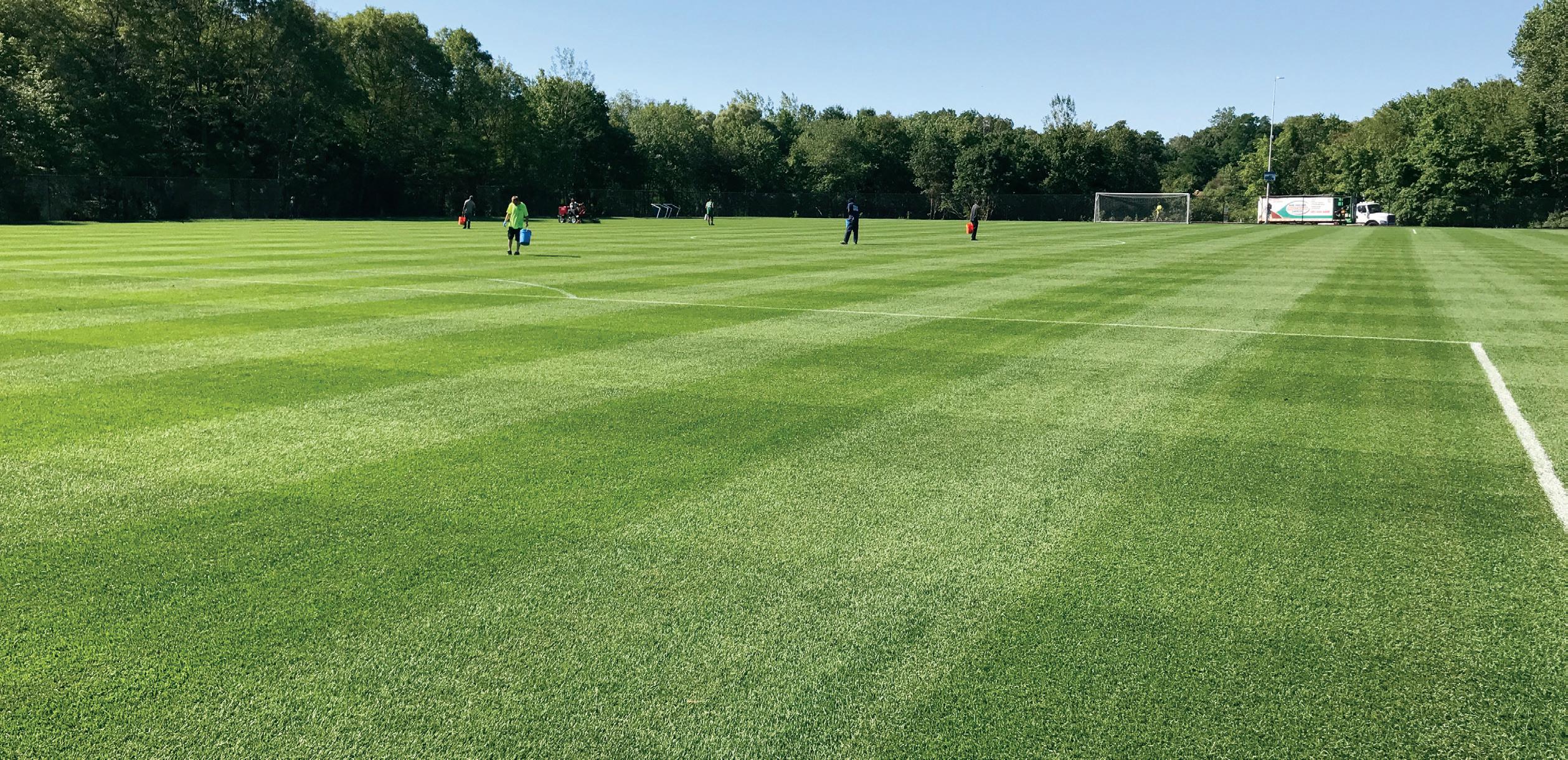
After each practice Gillette Stadium field staff fill divots with seed mix and provide a fresh mow.
NESTMA member Patrick Maguire, RLA is President and Founding Principal at Activitas a planning, landscape architecture, civil engineering, and athletic facility design firm based in Dedham, Massachusetts. Contact him via email at epm@activitas or phone (781) 355-7047. Activitas.com.
